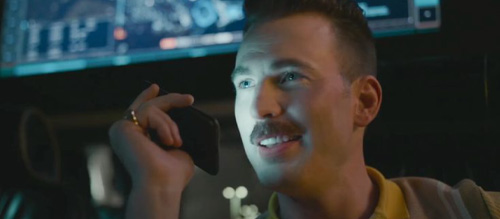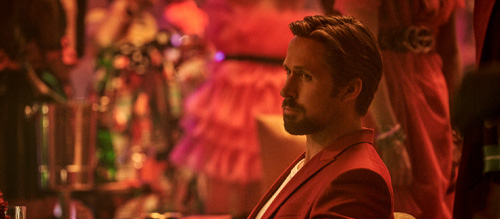The Gray Man (2022)
Directors: Anthony Russo, Joe Russo
Screenwriters: Joe Russo, Christopher Markus, Stephen McFeely
Starring: Ryan Gosling, Chris Evans, Ana de Armas, Billy Bob Thornton, Regé-Jean Page, Jessica Henwick, Julia Butters, Dhanush, Alfre Woodard
Have we not grown tired of this nonsense yet? It seems that in no walk of life are we beyond the reaches of work, in this case able to escape the foundational layer of an endless Content-As-Capitalism pie, our watch-time as valuable to the oncoming advertisers-as-customers “service” model as it is to the ruling class of economy-shaping shareholders currently competing for our attention and then taking away anything we’re mildly interested in the moment we stop serving their needs. It’s all very boring, and movies-as-content streaming releases are as lacking in personality, in artistry, as your average Happy Meal. “Shove the shooty bang bangs down with some handsome actor soup” seems to be the advice of the capitalist doctor, “don’t think, just earn us money by spending your time”. It’s seemingly endless, and they churn out more “content” each week thinking it’s a bottomless meal, but there is surely a threshold we must be inching towards? Not everything can be this utterly lifeless.
Anthony Russo and Joe Russo have certainly proven themselves as makers-of-hits, the directorial duo responsible for a serious uptick in the Captain America franchise as well as the two greatest Marvel juggernauts of all time, Avengers: Infinity War and Avengers: Endgame. They excelled in their young careers as directors of action, and post-MCU have edged back towards more traditional versions of the genre (both as directors and producers). In their latest direct-to-streaming effort, Netflix’s The Gray Man, their talents at identifying the foundations of action cinema’s greatest appeal is clear: they have aimed to show us parts of the world we don’t often get to see, they’ve filled each fight scene with colours and contrasts in light, the 1.5x speed edit of the stunt work has once again amped up the brutality and impact of each point of contact, and they’ve cast plenty of attractive people in fashionable clothes doing trailer-friendly poses. But in wanting so desperately to do these things, and being motivated to do so because of how ticking these boxes is the formula in town for selling a project to an astonishingly rich and always-attention-grabbing streaming service, the brothers Russo have effectively foregone any duty of care to their audience or their form, shaping nothing more than an almost-Bourne, an almost-Bond, an almost-Captain America. They have, undoubtedly, in their soulless presentation of the most ill-conceived of all of 2022’s blockbusters, reached tragic self-parody.
“Film by algorithm” is a phrase thrown around at anything lacking an inch of originality but presented with a big tech-firm-backed budget, and The Gray Man could certainly be associated with these Red Notice-type films, its overwhelming pursuit of every inch of virality coming at great detriment to an already weak and underdeveloped plot. Why have any meaningful interaction when you can (not even ironically) play every showdown like the concluding shot of a cheap perfume advert or video game choose-your-character screen, each depthless man’s man walking towards the other against some uncanny valley-level-bad backdrop created by CGI? The star power ensures it will sell well in those 6 seconds of YouTube ads we are fed before “skip ad” pops up, and it’ll probably reach a few million people via TikTok because of this. Who knows if the actors were even in the same room. It doesn’t even matter if they were or not… this isn’t meaningful or even professional filmmaking, it’s cheap and wholehearted exploitation. Exploitation of us, of course, but also of the form itself. This is faux film. It is, like faux fur, very close to something else (in this case something we once associated with, once were enlightened by), but isn’t actually that thing at all. It’s like Coca Cola in 2022, a product not even close to resembling the very thing its logo represents.
Like 2021’s “big Netflix blockbuster” Red Notice, The Gray Man lacks the capacity to move beyond product and into the realm of art, but at least Red Notice had the natural nod and wink presences of a Ryan Reynolds and Dwayne Johnson, as well as all the “watch for a bit of fun” aspects that underpin each actor’s career. In The Gray Man, Ryan Gosling and Chris Evans are dull. They’re boring. They’re gray.
Whatever happened to the movie star? Must even the critically acclaimed and always brooding Ryan Gosling be stomped into the streaming service carpet? Was taking Leonardo DiCaprio not enough of a sacrifice? It’s a shame that someone as talented and as versatile as Gosling would be interested in playing the typical mass murderer with a heart of gold for a streaming service uninterested in painting that archetype in any kind of colour, and it’s a really odd experience to see the man who was magnetic as a silent-killer-type in Only God Forgives (2013) effectively play back the same gimmick only with one tenth of the effectiveness. In The Gray Man he is uninterested, barely present, a shadow of the actor that lit up The Other Guys, that anchored Drive, and he is written as if barely present too – a mere wooden board from which other characters can bounce exposition off.
Similarly, Billy Bob Thornton seems to have forgotten who in the hell he is, while Alfre Woodard is about as present as a round of bullets in this gun-friendly actionothon. Ana de Armas can come out of this with a little bit of credit, and thus continues her streak of diverse and charismatic performances, but walking “other Netflix products” promo Regé-Jean Page is astoundingly out of his depth, the ‘Bridgerton’ actor chewing up scenery as a non-descript bad guy with some of the worst over-acting since Harry Melling’s laughably over-the-top performance in Netflix’s The Old Guard (2021).

It is, however, Chris Evans who takes the biscuit. The Russo Brothers’ favourite collaborator probably didn’t even think twice about answering the phone to the filmmakers who saved his turn as one of the most recognisable characters on Earth, but he hasn’t been this outlandish and simply unbelievable since Not Another Teen Movie in 2001 – this is certainly more The Losers than Sunshine or Snowpiercer. His handlebar moustache, slicked-back undercut and shoes without socks make for an idea of someone interesting, especially when played by a one-time America’s Sweetheart, but he’s a walking viral campaign. Some of his scenes have already become TikTok sounds. It’s not because they’re good, it’s because they’re funny. And they’re not funny because they’re well written or well-performed, but because it’s odd to see someone like Chris Evans shout that he got shot in the ass. It’s basic humour that is better served by the Minions, and Evans’ embrace of its silliness only worsens an already frankly ridiculous antagonist. He stands around shouting a lot, clearly restricted by recording parts of his role during the pandemic, and despite all this needless vocal interaction reducing anticipation of his inevitable confrontation with Gosling, the resulting conversation and fight still doesn’t manage to clear a very low bar.
It is this, the forced reduction of anticipation followed by an even more underwhelming result, that is the crux of the problem with The Gray Man. It is a film too long and too boring for low attention spans but constructed to appeal to those same people, thus isolating both ends of the spectrum. Fights are mediocre at best, the CGI is in places so bad it’s unforgiveable (they literally blur some moments so as to not have to animate them), the cinematography looks exactly like it was filmed in a green screen studio with actors walking on treadmills, there is an uncomfortable affinity with using cheap and nasty drone shots as establishing shots then placing big and bold location tags over them, and the script’s foundations are beyond basic (even including a “big house for lots of guns” ending, and a very on-the-nose hedge maze chase sequence). Everything else – the score, the colour grading, the wardrobe, etc. – is simply so by-the-book it’s barely noticeable, and in being so is probably the only solid aspect of this feature-length streaming presentation.
The Gray Man is not Netflix’s Bond movie, even if Bond’s inspiration is so present that the main character is named Six (“because 007 was taken” – an actual line from the movie). It is boring, shallow, utterly forgettable so-called action cinema; a movie made by executives for executives; a blot on the careers of both Gosling and Evans. Cinema has never been the exclusive realm of the artistic, but once upon a time there was a need for any given film to be unique enough or good enough to sell itself (first in the cinema, then on home video, then to television), and in a summer that has seen paying audiences embrace quality filmmaking in record-shattering ways for the likes of Everything Everywhere All at Once and Top Gun: Maverick, it is simply damming to the film industry to witness another lifeless and soulless product like this encroach into the same space. Enough is enough.
3/24


